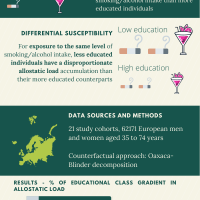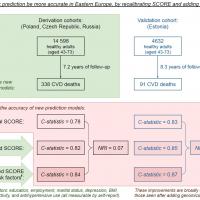Centro ricerche in Epidemiologia e Medicina Preventiva - EPIMED
History and our mission
The Centro ricerche in Epidemiologia e Medicina Preventiva "EPIMED" at the Insubria University at Varese, was established on November 22nd, 2010. The EPIMED Centre is connected to the Department of Clinical and Experimental Medicine. The Director of the Centre is Professor Licia Iacoviello.
The primary aim of the Centre is to promote applied research in the biomedical field and to develop epidemiological methodology and statistics which can be applied to biological phenomena and significant pathologies with substantial social impact.
By nature it is an interdisciplinary centre, encopassing the fields of epidemiology, preventive medicine and biostatistics. This peculiar diversity allows the promotion of a number of scientific collaborations to investigate research questions, utilizing a variety of research methods and statistics in different clinical settings and public health setting.
Our research by images
-
Education and allostati load: what are the mechanisms of action?
https://jech.bmj.com/content/early/2020/09/03/jech-2020-213946 -
Social factors and cardiovascular risk prediction
https://doi.org/10.1093/eurheartj/ehaa571
Hot of the press
- Burnout and PTSD in healthcare workers, before and during the COVID-19 pandemic
- Med diet and arterial stiffness in the RoCAV Study cohort
- Big data, observational studies and p-value: a recipe for false positive findings?
- Work stress, phyical activity, and their interaction, on cardiovascular disease risk
Work with us! Open(ing) positions
There are no open position at this time
Our research projects in air pollution and health
- Air pollution and COVID-19
Does air pollution contribute to the spread of COVID-19? The EPIMED Center has activated two studies with the Lombardy Region and ARIANET which will allow to investigate this relationship in the Varese area
Results: full text OEM papers
Our research projects in Occupational and Preventive Medicine
For the assessment of work-related stress, the EPIMED Center has developed a multi-factor work plan that combines indicators derived from company data (turn-over, down-sizing, absenteeism and injury indicators, overtime, shift work) to psychometric scales from individual questionnaires.
To find out more: questionnaire site – applied methodolgy
- Impact of the COVID-19 pandemic on the healthcare workers
Project funded by the Veronesi Foundation in which the antibody level and the psycho-social impact of the pandemic on healthcare workers will be evaluated in two hospitals, one in the Lombardy Region and the other in the Molise Region. The project is finished, but data analyzes are in progress.
- Results: antibody response to the anti-COVID-19 vaccine - Mental health of healthcare workers: protocol - validation scales - burnout and PTSD
- Work-related stress and cardiovascular risk
The effect of work-related stress on the cardiovascular system is known, but the mechanisms of action remain controversial. Using worker samples, we addressed some of these, such as: alterations in heart rate variability and disproportional accumulation of allostatic load
- Biological accidents
What is the role of organizational factors with respect to the temporal trends of biological injuries of healthcare personnel? An analysis of ten-year data from a hospital in Varese tries to investigate it. Here the results!
Our research projects in Cardiovascular Epidemiology
- RoCAV Study Risk Of Cardiovascular diseases and abdominal aortic Aneurism in Varese
Population-based cohort (sample size 3777) of residents in the city of Varese aged 50 to 75 years old at recruitment (2013-2016)
Research topics: Diet and arterial stiffness – Prevalence of aneurism - Study protocol –
Documents: Data Quality Assessment spirometry - Data Quality Assessment dietary intake questionnarie - MORGAM/BiomarCaRE collaborative studies (www.thl.fi/morgam)
International collaborative study of European cohorts, with harmonized baseline data collection and follow-up for cardiovascular events
Research topics: Determinants of social inequalities in CVD – Social inequalities in CHD/Stroke incidence – CVD absolute risk modelling in Europe - Cohorts Collaborative Study in Northern Italy (CCSNI) and cardiovascular disease
A collaborative study of population-based (MONICA-Brianza, the PAMELA Study) and factory-based (the SEMM Study) cohorts, summing up 14000 individuals, with harmonized risk factors measurement at recruitment and a median of 15 years follow-up for cardiovascular disease events and cause-specific mortality.
Research topics: Perceived work stress – CVD absolute risk modelling – Psycho-social and occupational risk factors
Our research projects in Biostatistics
- Big data, selection bias, observational studies, and p-value
The p-value paradigm meets the most recent observational studies features: large sample size, low partecipation rates, and a potential selection bias. How does it go?
Pubs: Paper 1 – IJE 2020
Staff
- Prof. Licia Iacoviello, epidemiologist, Director
- Prof. Marco M Ferrario, epidemiologist and occupational health specialist, past Director
- Prof. Francesco Gianfagna, epidemiologist
- Prof. Giovanni Veronesi, biostatistician
- Dr. Alessandro Gialluisi, epidemiologist
Partners
- ATS Insubria di Varese
- Centro Interuniversitario Healthcare research and Pharmacoepidemiology (HRP)
- Centro Studi Sanità Pubblica (CESP), Università di Milano-Bicocca, Monza
- Istituto Neurologico Mediterraneo NEUROMED, Pozzilli (IS), Italy
- Istituto Superiore di Sanità, Roma, Italy
- Progetto BiomarCaRE
- Progetto MORGAM
- Società Italiana di Statistica Medica ed Epidemiologia Clinica (SISMEC)
Location, working hours and contacts
Ex-Cascina Agricola, Via Monte Generoso 71, 21100 Varese – Italy
Mon-Fri 9.00 am – 6.00 pm
@: segreteria_epimed@uninsubria.it
tel: +39 0332 21 7222
fax: +39 0332 39 5596


